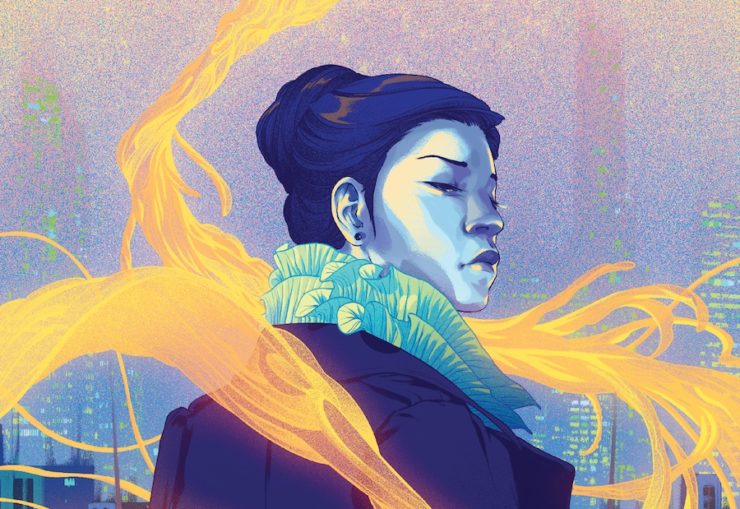The speed of my reading lately frustrates me. I need to read faster, so I can talk about some of the amazing-looking novels in my to-be-read pile, like Elizabeth Bear’s The Stone in the Skull, K. Arsenault Rivera’s The Tiger’s Daughter, Jodi Meadows’ Before She Ignites, Nnedi Okorafor’s Binti: The Night Masquerade, and, oh, let’s call it several more. (“Several” is such a flexible word.) Because they all look good, and some of them—like R.E. Stearns’ Barbary Station, who doesn’t love pirates and mad AIs?—look like me-catnip.
There are so many books in the world, and so little time.
Let me segue from this eternal truth (the eternal cry of the voracious reader) to a related matter, one that has returned to my mind more and more often this year. That’s the issue of scarcity: the scarcity of certain kinds of stories, certain kinds of protagonists, certain representations of ways of being. There are so many books in the world, and so little time—but when it comes to some kinds of stories, there are still so few that reading three in row without actively looking for them is a visceral shock.
Bear with me: I’m reaching towards things that I find hard to put into words.
I’m a queer woman (bisexual, and to a degree genderqueer, if precision matters). Much of my reading experience, particularly with new-to-me authors, and even more so with male authors, involves bracing for things that are tiresome, wearying, and/or hurtful. Whether it’s active misogyny, background sexist assumptions, gratuitous sexual assault of women (which may or may not be used to motivate the character arc or development of male protagonists), Smurfettes, women without communities that include other women, transphobia, Buried Gays, or just the general sense that the world the author’s created has no room for people like me in it, there’s frequently a level of alienation that I need to overcome in order to be able to enjoy a new book—or film, or television show, or videogame, etc.—and constantly being braced for that alienation is exhausting.
And that’s even before we get to books that are outright badly done, alienating in ways that aren’t aimed at me (but fuck racism), or just aren’t to my tastes (a lot of comedy, most horror, certain themes that need to be really well done to work for me).
But I’m so used to experiencing this alienation, or to expecting it, that it’s a wrenching shock when I find books that just… welcome me in. That don’t place any barriers in my way. I don’t notice the amount of effort overcoming this alienation requires until I don’t have to make that effort—like not really knowing how much pain you were in until it stops.
Recently I read five books in a row where the books were, in more ways than not, books for me. Now, one novel on its own isn’t a rarity. Two happens… not as much, but still quite a lot. But a run of three or more, unless I specifically sought them out and/or reread? Friends, that’s damn near unprecedented. (And at least one of them—Max Gladstone’s Ruin of Angels—had a pair of queer romance arcs whose culmination, in both cases, damn near made me cry ugly tears of relief and gratitude.)
This led me to wonder out loud: is this feeling of utter acceptance, of being a normal and unremarkable part of the landscape, of being self-evidently interesting and complex and worthy of multiple different protagonist-type roles, and also not dead, invisible, brutalised, or in doomed love—is this what (straight, white) guys just… expect to find when they come to fictional narratives? Is this one of the ways their experience of the world differs from mine?
If so, wow. I cannot articulate the difference it was, to read five books in a row where most of the protagonists were women, most of them were queer, and most of them had relationships that did not end in doom and grief.
It’s been making me think afresh about the problem of scarcity, and how books and other fictionalised narratives with non-straight non-white non-guy protagonists carry so great a weight of hopes—because there have been so few of them, comparatively, that it’s not like you can just shrug and find another with a protagonist that reflects these aspects of your identity if you don’t like it. (And if it’s badly—insultingly—done, then it’s like being slapped with a rotten fish.) It’s also making me think about the cues that indicate to me that a work of fiction has good odds of being an inclusive narrative, along more than one axis: the cues that signal this work of fiction has a good chance of being welcoming to me.
Spoiler: those cues rarely turn up on cover copy, and only sometimes in cover art. Press releases are a little better, but most of the time, it’s hard to tell unless you have word of mouth, really.
So I’m left thinking about the ways that weight of alienation has shaped, and is shaping, my engagement with narrative, and my critical engagement, in ways that I can’t see. It’s only its occasional and utterly shocking absence that has let me come to realise it’s even there. What does it mean?
I don’t know, but I’m still thinking.
Liz Bourke is a cranky queer person who reads books. She holds a Ph.D in Classics from Trinity College, Dublin. Her first book, Sleeping With Monsters, a collection of reviews and criticism, is out now from Aqueduct Press. Find her at her blog, where she’s been known to talk about even more books thanks to her Patreon supporters. Or find her at her Twitter. She supports the work of the Irish Refugee Council and the Abortion Rights Campaign.










